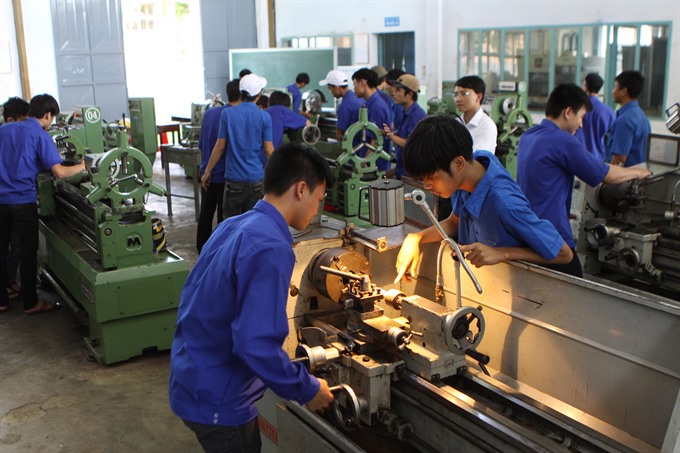 Society
Society

It took more than a year and US$10,000 per person for a foreign-invested electric engineering company in central Quảng Nam Province to send two workers abroad for training after they were hired.
 |
| Trainees practise their knowledge and skills at Đắk Lắk Vocational Training College. — VNA/VNS Photo Dương Giang |
HÀ NỘI – It took more than a year and US$10,000 per person for a foreign-invested electric engineering company in central Quảng Nam Province to send two workers abroad for training after they were hired.
Although the two workers had graduated from a well-known university with good and excellent degrees, they still needed training for their jobs, according to Denken Việt Nam Ltd. Co’s Managing Director Nguyễn Đăng Trình.
“However, only one of them meets requirements to become a technician in producing automatic electrical control boards,” he told the Diễn đàn Doanh nghiệp (Business Forum) newspaper.
This is not just a problem for Denken.
Businesses, particularly foreign direct investment (FDI) business, are in dire need of high-quality human resources in the context of deeper integration into the world economy, especially after the Comprehensive and Progressive Agreement for Trans-Pacific Partnership (CPTPP) was signed.
The CPTPP promises many opportunities for Việt Nam but the country needs good human resources to take advantage, according to experts at a workshop held in Hà Nội on Thursday to improve human resources in the light of the CPTPP.
The Việt Nam’s Provincial Competitiveness Index (PCI) 2017 report launched last month showed that 55 per cent of businesses find it hard to employ enough qualified candidates.
Head of the Employment Department under the Ministry of Labour, Invalids and Social Affairs Lê Kim Dung said Việt Nam boasted abundant and stable human resources but human resource quality was limited.
The low rate of workers undergoing vocational training and a shortage of skilled workers failed to meet market and integration demands.
“Meanwhile, the gap between education and training and labour market demand keeps increasing,” she said.
According to the department’s report, the number of unemployed university graduates in the third quarter of 2017 increased by 4.51 per cent to 237,000 compared with the second quarter of the year.
Experts at the conference also warned about possible impacts of the fourth industrial revolution, which will create huge changes in terms of labour supply and demand with the proliferation of robots.
Solutions
Chairman of the Việt Nam Chamber of Commerce and Industry (VCCI) Vũ Tiến Lộc said the improved education and training system and labour quality were important tasks.
Businesses should work with the education sector to reform education and training, particularly changing vocational training in Việt Nam, he said.
“Businesses should not only forecast labour demand and make orders with education establishments but also participate in building education curricula and teaching,” he said.
Newly-recruited technicians and engineers often only meet basic knowledge requirements and it takes between 6-12 months and a lot of money to provide them with specialised knowledge and skills, Đào Thị Thu Huyền, Senior Manager of the General Director Office at Canon Vietnam, told the Diễn đàn Doanh nghiệp.
Dung from the employment department said vocation training in Việt Nam remained slow in comparison with other countries. The competition between Việt Nam and other countries in supplying high-quality human resources required the country to improve training quality.
She proposed increasing co-operation between vocational training establishments, providing training for teachers to improve vocational teaching quality and providing re-training for current employees.
Stephan Ulrich, Regional Programme Manager of Sustaining Competitive and Responsible Enterprises of the International Labour Organisation, said to prepare the labour force, it was essential to expand universal primary and secondary education, promote the enrolment in science, technology, engineering, and mathematics, strengthen apprenticeships and work-based learning.
He also pointed to the need to create feedback loops between the private sector, training providers and the public sector. — VNS




